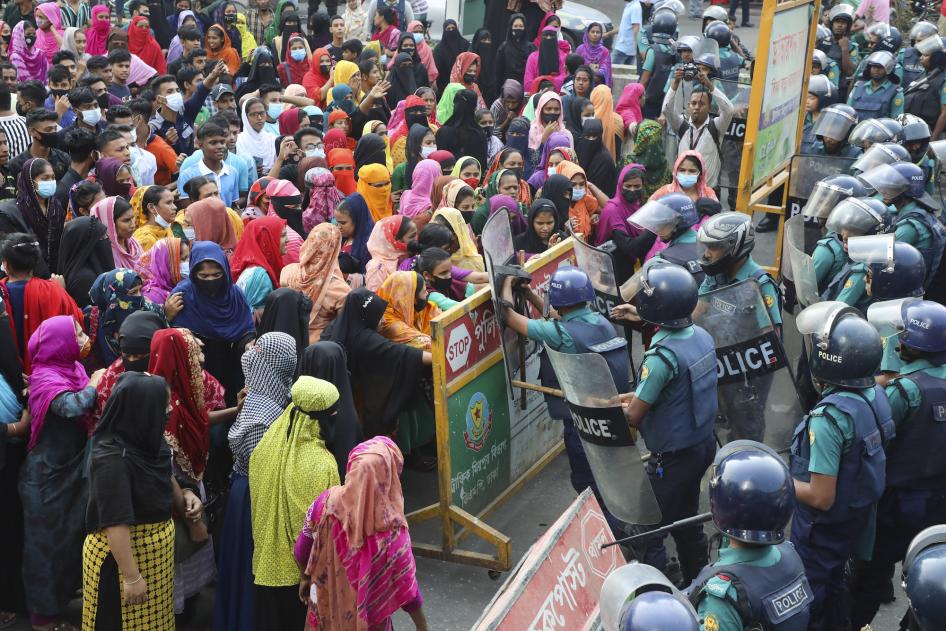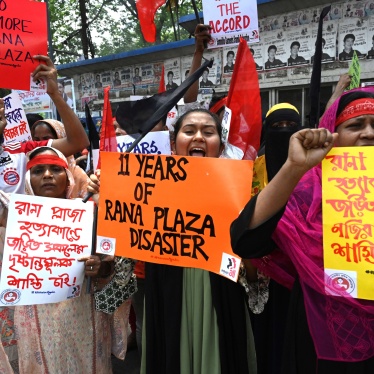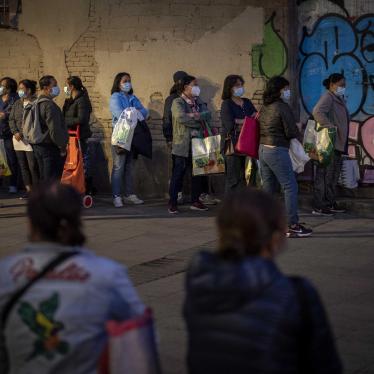Eleven years after the horrific Rana Plaza building collapse in Savar, on May 24 the European Union adopted a new law that requires large companies to adhere to human rights and environmental standards in their own operations and their global value chains. Bangladesh is an important hub of manufacturing, especially for ready-made garments, and its factories are part of the value chains of global brands and retailers that will be affected by this directive.
The EU directive's key takeaways
The Due Diligence Directive is groundbreaking because it will require all 27 member countries of the EU—one of the world's largest markets—to regulate the human rights and environmental footprint of thousands of large corporations across various sectors, including those manufacturing their products from countries like Bangladesh.
It will apply to any EU-based company—not just garments and textiles—that has more than 1,000 employees on average and an annual global turnover of more than 450 million euros. It also applies to foreign companies that have a net annual turnover of more than 450 million euros in the European Union. The Centre for Research on Multinational Corporations, a non-governmental organisation, published a preliminary estimate that the directive would apply to about 5,400 companies registered in the EU, across all sectors. Giant fast fashion, luxury, sports, including retailers such as ALDI, H&M, Inditex (Zara), Adidas, Nike, and LVMH, should be covered.
The directive defines due diligence and outlines key steps that companies are required to take to comply with it. It applies to the company's own operations and in relation to businesses involved in production, distribution, transport, and storage of the company's products. It empowers regulators to oversee the due diligence measures and impose penalties where companies fall short and, in some scenarios, provides a legal avenue for victims of corporate abuses to bring civil claims before European courts.
On the downside, the directive falls short in numerous ways. It excludes a vast part of the financial sector and applies mostly to businesses involved in production and distribution of goods and services, leaving large gaps when it comes to the due diligence by a corporation on how its goods and services are used or disposed of.
One of the most interesting features of the EU directive is the obligation on brands to "meaningfully engage" with stakeholders to design their due diligence measures. This includes workers and communities whose rights will be affected, and groups representing their rights and interests. The directive opens the doors for independent local unions, women's rights groups, sexual and reproductive and mental health rights organisations, and privacy and data protection experts who have demonstrated expertise working in Bangladesh to provide feedback to brands and retailers as they assess human rights and environmental risks in their value chains and develop measures to prevent and remedy harm.
Officials in the EU cannot enforce the directive overnight. It is designed to apply to companies in a staggered way, depending on a company's size. While a subset of companies should start following the rules in 2027, all companies covered by the directive will only have to conform from 2029. Translating the directive into the national laws of EU member-states will also take time. Scrutiny of corporate due diligence practices and enforcement of the directive through national laws, regulators, and courts is still three to five years away.
A preparatory window: Opportunity for reforms on wages and freedom of association
The silver lining of the three-to-five-year wait is that it offers large brands and retailers sourcing from around the world time to revamp their due diligence systems to be better prepared for the enforcement phase of the directive. It also offers countries like Bangladesh time to usher in progressive reforms, including those in the National Action Plan on the Labour Sector. This window provides any additional time needed for Bangladesh's industry, especially the ready-made garment and textile sector given its significance for exports, to press ahead with critical legal and other reforms that are long overdue to reduce labour risks.
When it comes to the garment sector in Bangladesh, the authorities should prioritise legislative reforms, including reforms to labour laws and laws governing special economic zones, to bring them in line with the international human rights, labour rights, and environmental standards. They should also break with previous damaging patterns that have harmed not just garment workers, but the sector overall. Doing so would alter how companies evaluate and respond to labour rights risks in Bangladesh.
The Bangladesh government should also prioritise reforms around living wages and workers' freedom to join and form independent unions. There have been recurrent horrific patterns: failed negotiations in 2016, 2019, and 2023 around minimum wage increases; the government's paltry increases in wages; the resulting wildcat protests by garment workers that were met with brutal police crackdowns; and criminal complaints or unfair dismissals by factories retaliating against workers and independent union organisers.
In 2023, during the last minimum wage revision process, Bangladesh authorities rejected independent unions' demands to raise minimum wages from Tk 8,000 to Tk 23,000, still below what some studies showed would constitute a monthly living wage. Instead of seeing the desperation of poor workers protesting on the streets, the police responded with excessive force, with the government ultimately adopting a minimum wage of just Tk 12,500 in late November 2023, going into effect in December 2023. This increase was too little, too late, and continues to make better wages hinge on overtime work, which is itself a pernicious practice.
Following the October protests, at least 35 criminal complaints—25 of them by factories supplying global brands—were filed against dozens of named workers for vandalism and other crimes; thousands of other unnamed workers were included in these complaints.
Since November 2023, worker rights groups have been at the forefront of trying to ensure that workers get legal assistance and push brands to intervene to have factories drop baseless criminal complaints and to support workers in getting them quashed in local courts.
'Blacklisting' workers, biometric databases exacerbating human rights harms
In an ongoing fallout from the 2023 protests, factories are "blacklisting" workers—firing them without due process by accusing them of participating in protests and effectively barring their reemployment by many other factories. This is not a new tactic. In the past, workers have repeatedly shared concerns that factories share lists of "blacklisted" workers. Blacklisting workers—labelling and identifying workers as organisers and preventing their re-employment in other factories for participating in protests—is a violation of labour rights.
Anecdotal evidence suggests that a biometric database, which collects workers' National ID and fingerprints, is exacerbating problems for workers and fuelling unfair labour practices. Khalida Sultana, a worker in her 20s who spoke to Human Rights Watch (HRW) last month, is an example. She worked in a garment factory that supplied global brands for five years, earning Tk 16,000 at the time the wage protests broke out in October last year.
The money she and her husband earn is not enough to support her immediate family and her parents back home in their village. The factory fired Sultana without any notice or due process as required under labour laws. She learnt from friends and line managers that she had been implicated in a criminal case in relation to the protests, falsely accusing her of crimes she did not commit.
When she sought employment in another factory that had advertised for jobs at their gate, she passed preliminary interviews and was asked to meet officials in the human resources department. But after the human resources office took her ID and fingerprint, they told her she was barred from being employed because her name was red-flagged in a biometric database.
Biometric data—personally identifiable sensitive data—are inherently high-risk. Under international human rights standards, any collection of biometric information should be undertaken only when there are robust and clear legal safeguards outlining the circumstances under which private firms are allowed to collect, use or transmit biometric data. The lawful purposes and methods used need to be proportional to and necessary for the purposes, and give people the right to have their biometric data erased and access to effective remedies when legal safeguards are flouted.
Evidence of misuse of any biometric database to blacklist garment workers demonstrates that any existing safeguards are completely inadequate.
Bangladesh does not have any robust safeguards around data protection and privacy, which limits the ability of employers to collect, store, save and transmit personal data, including employment history. Recent efforts to reform data protection laws have been flawed, and rights groups have criticised them as vague, with wide exceptions to the right to privacy, and with little accountability for data privacy violations.
Revamping and innovation on due diligence measures
By any reasonable assessment, unless the Bangladesh government prioritises rights-aligned reforms, brands and retailers sourcing from the country would have to factor in these high risks for labour abuses into the risk assessments as part of their due diligence.
The Bangladesh Garment Manufacturers Exporters Association (BGMEA) should be at the forefront of signalling that they want to chart a different course for garment workers' rights and the industry overall. The BGMEA states that it set up a biometric system to help dispense workplace benefits for workers. It has actively required the collection and use of biometric systems among its membership for some years, including in 2024. The association could start by suspending the use of any biometric database, help get baseless criminal cases against workers and independent union organisers quashed by local courts and secure bail for union organisers still in jail.
Any effort to "register" workers to ensure that they receive workplace benefits should be discussed with independent unions, and privacy rights and data protection groups, so that any worker "registration" deemed absolutely necessary is designed, hosted, and administered in ways aligned with international human rights standards and that prevent fuelling labour abuses.
Global brands and retailers that will be affected by the directive should revisit their due diligence efforts, incorporating key measures that credible civil society organisations consider important, and designing new ones in partnership with independent unions and other rights groups that are focused on outcomes for workers.
Human Rights Watch and other organisations have repeatedly called for brands to trace and publish their supply chains through efforts like the Open Supply Hub and Mapped In Bangladesh. Brands should also heed calls to ensure that their purchasing practices are fair through a combination of efforts, drawing from the Responsible Contracting Project's recommended fair clauses, using tools to determine how to set prices to provide living wages and pay fair prices, and explore ways of monitoring living wage outcomes for workers.
Brands and suppliers would also need to recognise the limitations of social audits and certifications—which largely depend on on-site private inspections covering a breadth of issues over a couple of days—and move beyond relying on such measures to address concerns about workers' freedom of association, child labour, forced labour, and discrimination. Especially when it comes to issues like freedom of association, neither brands nor suppliers can prevent or mitigate any risks with social audit reports that recycle stock language across different factory reports as findings.
The next few years could be rich with innovation, where brands and suppliers work collaboratively with independent unions and credible local and global rights groups to design and roll out alternative monitoring tools that focus more on outcomes for workers. These should include initiatives like binding agreements whose results are transparently and publicly reported such as the International Accord for Health and Safety in the Textile and Garment Industry.
Rather than repeating old and ineffective due diligence measures, this phase depends on inspired leadership and creativity on what effective due diligence under the new EU directive would look like rather than being solely focused on generating profit for brands and suppliers at the expense of workers.
The author acknowledges research contributions from a colleague at HRW.










